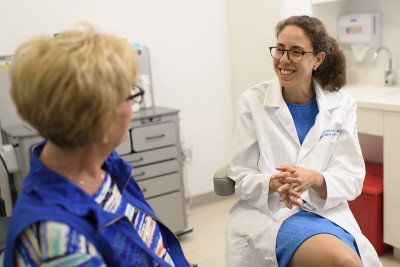
There are several ways to treat head and neck cancer, including:
- head and neck surgery to remove the tumor
- radiation to the head and neck, using high-energy rays such as X-rays to destroy cancer cells
- chemotherapy with drugs designed to kill head and neck cancer cells
- radioactive iodine therapy (for thyroid cancer)
Which treatment or combination of treatments is right for you depends on the stage of the cancer and where it began.
- The main treatment for mouth cancer and salivary gland cancer is usually surgery. Sometimes radiation or chemotherapy are given after surgery to reduce the chances that the cancer will come back.
- Surgery, radiation, and chemotherapy are all common approaches for people with throat cancer or sinus or nasal cavity tumors. MSK offers specialized treatments for oropharyngeal cancer linked to HPV infection.
- Surgery is also the most common treatment for thyroid cancer and parathyroid tumors. If you have a small, low-risk papillary thyroid cancer, you may choose to participate in our program of active surveillance.
Quality of Life after Head and Neck Cancer Treatment

Quality-of-life considerations are a vital part of the care we offer. Our head and neck cancer team keeps a close watch over the people we care for to make sure they get the resources and support they need to cope with any side effects that come up.
For example, the team has developed an online questionnaire called FACE-Q. It allows our patients to report their treatment experience to us in real time. The information is automatically fed into the medical record. It helps the team make prompt referrals to experts in rehabilitation, pain management, or social work.
We are always looking for ways to make you more comfortable during treatment. Until recently, many people with head and neck cancer had feeding tubes put in place to help avoid the complications of radiation treatment. At MSK, we pay careful attention to swallowing therapy and symptom management. Now the vast majority of people with head and neck cancer complete treatment at MSK without a feeding tube. If you require chemotherapy, our highly trained nurses may be able to administer treatment using a temporary IV instead of a long-term intravenous catheter if that’s your preference.
Why choose Memorial Sloan Kettering for head and neck cancer care?
We’re always improving the treatments available to people with head and neck cancer. In fact, our experts were involved with many of the modern approaches used to treat head and neck cancer. These include surgical and reconstructive surgery techniques, along with advanced methods of fighting cancer with radiation and radiation combined with chemotherapy.
Choose Memorial Sloan Kettering for head and neck cancer care because:
- We provide unparalleled skill and experience in head and neck surgery. Our techniques include innovative approaches to preserve your appearance and the function of your mouth and throat. We personalize your care based on genetic information about the tumor.
- We deliver more-effective radiation to the head and neck using the most-precise methods available. We tailor these treatments specifically for head and neck cancer. We’re one of a limited number of treatment centers nationwide that offer proton therapy.
- People with advanced disease have access to experts who specialize in chemotherapy for head and neck cancer. We may be able to offer you new drug treatments, such as immunotherapy and targeted therapy, through our program of head and neck cancer clinical trials.
- Our experts in oropharyngeal cancer have developed ways to enhance quality of life for people with HPV-related tumors.
- Our rehabilitation experts design individualized treatment plans. We help manage problems with speech, voice, swallowing, and other side effects of head and neck cancer and its treatment.
- Our dental team makes sure you’re in good oral health before treatment begins. We are there to support you during and after your treatment.
- Our patients receive follow-up care from a nurse practitioner who specializes in the long-term medical needs of people who been treated for head and neck cancer.
We’re available 24 hours a day, 7 days a week


